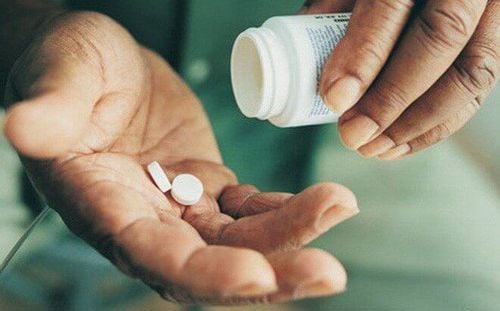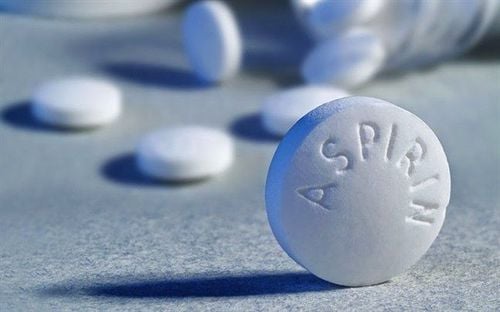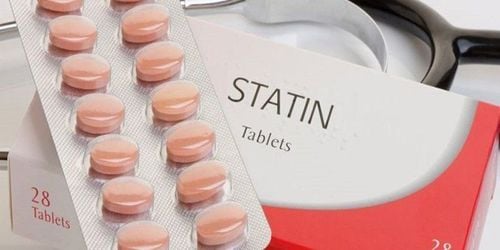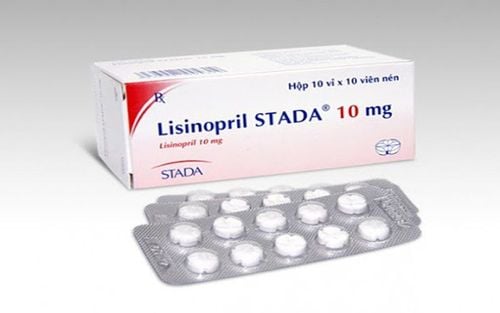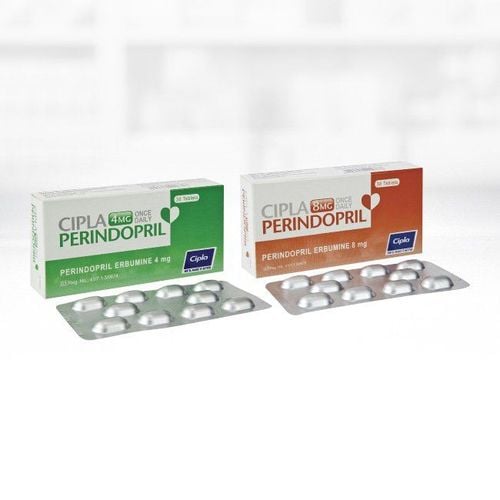This is an automatically translated article.
High blood pressure and dyslipidemia are two common diseases today and are the leading causes of cardiovascular events such as myocardial infarction, stroke. Amdepin Duo has two main active ingredients, amlodipine and atorvastatin, which can be used to treat hypertension and dyslipidemia.
1. What is Amdepin Duo?
Amdepin Duo has two main ingredients, amlodipine 5mg and atorvastatin 10mg. The effect of the drug depends on the effect of each main active ingredient. The mechanism of specific active ingredients is as follows:
1.1 Amlodipine Amlodipine is a calcium channel blocker drug. It is a derivative of dihydropyridine that blocks L-type calcium channels in arterial and cardiac smooth muscle, thereby reducing intracellular Ca, thereby preventing vascular smooth muscle contraction. Amlodipine exerts its antihypertensive effect by relaxing peripheral arterial smooth muscle and has less effect on myocardial calcium channels. Therefore, the drug does not affect atrioventricular conduction and myocardial contractility. Amlodipine may also decrease renal vascular resistance, thereby increasing renal blood flow and improving renal function. Amlodipine does not adversely affect blood lipid levels or glucose metabolism, so amlodipine can be used to treat hypertension in patients with diabetes mellitus.
1.2 Atorvastatin Atorvastatin is a statin drug. The drug selectively inhibits the enzyme HMG-CoA-reductase produced by the liver, preventing the formation of mevalonic acid which is a precursor in endogenous cholesterol synthesis. The drug also helps increase the expression of low-density lipoprotein (LDL) receptors on the cell surface, reduces total cholesterol, LDL, reduces production of VLDL, triglycerides and can increase HDL (the type of cholesterol that transports cholesterol). from peripheral tissues to the liver).
The combination of the two active ingredients is effective in lowering blood pressure and lowering LDL-C dose-dependently and does not change the effects of any of the ingredients compared to when using each agent alone.
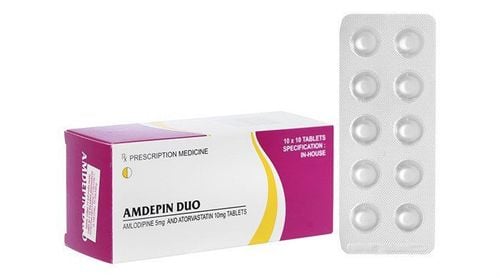
Thuốc Amdepin Duo được dùng trong điều trị một số bệnh lý tim mạch
2. Indications and contraindications of the drug Amdepin Duo
2.1 Indications Amdepin Duo can be indicated in the following cases:
Treatment of patients with dyslipidemia accompanied by hypertension Prophylaxis in patients with angina pectoris. 2.2 Contraindications Amdepin Duo is contraindicated in the following cases:
Patients with unstable heart failure. Hypersensitivity to amlodipine, atorvastatin or any of the other excipients Patients with progressive liver disease or persistent elevations of liver enzymes (>3 times normal) of unknown cause. Pregnant women, lactating women or women of childbearing age who are not using appropriate contraception Patients taking medications including telaprevir, tipranavir + ritonavir.
3. What is the dose of Amdepin Duo?
You can use Amdepin Duo at any time regardless of meals. The recommended dose is usually 1 tablet per day. However, the dose will vary depending on the individual tolerability, the severity of the disease. Patients should not arbitrarily use the drug, but should strictly follow the instructions and dosage of the doctor.

Để phát huy công dụng của thuốc amdepin duo thì người bệnh nên uống thuốc theo hướng dẫn
4. What to do in case of an overdose of Amdepin Duo?
4.1 Amlodipine Overdose of amlodipine may cause excessive peripheral vasodilation and may be accompanied by tachycardia. The consequences can be excessively low blood pressure or even fatal shock. Absorption of amlodipine was significantly reduced when activated charcoal was administered immediately or for up to 2 hours after oral administration of amlodipine 10 mg in healthy volunteers. In some cases gastric lavage may be necessary. In patients with severe hypotension due to amlodipine overdose, aggressive cardiovascular supportive measures including regular monitoring of cardiovascular and respiratory function, and attention to circulating volume and fluid intake are required. urine. In some cases, your doctor may prescribe vasopressors to restore blood vessel tone and blood pressure. Because amlodipine is highly bound to plasma proteins, dialysis is not effective.
4.2 Atorvastatin There is currently no specific treatment for atorvastatin overdose, so when a drug overdose is suspected, patients should immediately go to medical facilities for timely treatment. Because the drug is highly bound to plasma proteins (more than 98%), dialysis does not significantly reduce atorvastatin concentrations.
In case you forget a dose, take it as soon as you remember it. However, if it is almost time for your next dose, skip the missed dose and take your next dose as scheduled. Do not take a double dose.
5. What are the side effects of Amdepin Duo?
Undesirable effects when using Amdepin Duo include:
Digestion: Constipation, nausea, indigestion, abdominal pain, diarrhea. Nervous: Fatigue, headache, drowsiness, cognitive decline (such as memory loss, confusion...). Respiratory: Flu-like syndrome, pharyngitis, sinusitis Cardiovascular: Palpitations, hypotension, tachycardia Musculoskeletal system: Back pain, arthralgia, myalgia, myalgia. Body as a Whole: Allergic reactions, ankle edema, flushing, dizziness. Metabolic: Hyperglycemia, increased HbA1c. Other: Increased liver enzymes, When experiencing side effects of the drug, it is necessary to stop using the drug and notify the doctor or go to the nearest medical facility for timely treatment.
6. What is the note when using Amdepin Duo?
Use in Heart Failure: In a long-term, placebo-controlled study of amlodipine in patients with NYHA class III and VI heart failure, amlodipine was reported to be associated with increased incidence of pulmonary edema. In Patients with Impaired Hepatic Function: As with all other calcium channel blockers, the half-life of amlodipine is prolonged in patients with impaired liver function and therefore should be used with caution. in this patient. Atorvastatin can increase liver enzymes, causing serious liver damage with a frequency of 1.2 people / 100,000 people taking the drug after 3-4 months of treatment. Therefore, it is necessary to monitor liver function before starting treatment and when patients have signs suggestive of elevated liver enzymes (jaundice, dark urine, fatigue, weight loss, ...) Elderly: Clearance of amlodipine tends to decrease in elderly patients, resulting in increased AUC and half-life. However, the same dose of amlodipine can still be used in the elderly and in the young. Diabetic patients: Increases in HbA1c and fasting blood glucose have been reported with the use of atorvastatin. Muscle Effects: Treatment with statins is associated with a risk of myalgia, myopathy and, rarely, acute rhabdomyolysis. Creatine kinase (CK) should be monitored when the patient has any manifestations of myopathy such as myalgia, muscle weakness, cramps. It is possible to test CK before treatment, especially in cases of patients with impaired renal function, hypothyroidism, history of liver disease, heavy alcohol consumption, personal or family history of hereditary myopathy, history of myopathy due to previous statin or fibrate use, elderly patients with risk factors for myalgia/rhabdomyolysis, etc. Closely monitor the patient clinically for timely treatment. If CK results are > 5 times the upper limit of normal, statin therapy should not be initiated in the patient. Note that the patient should be monitored for muscle symptoms such as muscle pain, muscle weakness, etc. When having these symptoms, the patient should contact a doctor for advice. Ability to drive and use machines: This medicine may affect the ability to use machines due to the risk of some side effects such as headache, dizziness, fatigue. Therefore, caution should be exercised when initiating drug therapy. Pregnancy: Atorvastatin is contraindicated in pregnancy. There are reports of birth defects after maternal use of statins during pregnancy. The temporary discontinuation of lipid-lowering drugs during pregnancy is not expected to have a significant impact on the long-term outcome of primary hypercholesterolemia treatment. Atorvastatin should be discontinued immediately if an unwanted pregnancy occurs during treatment. Nursing Patients: It is not known whether atorvastatin passes into breast milk. However, it is contraindicated for use by women who are breastfeeding. Drug Interactions: Some drugs when used concurrently with Amdepin Duo can cause many adverse reactions. For example, the combination of some drugs can increase the concentration of Atorvastatin in the blood, thereby leading to many adverse events (Erythromycin, clarithromycin, antifungal ketoconazole, itraconazole,...). Serum concentrations of atorvastatin may also be increased with grapefruit juice ingestion. It is best to tell your doctor or pharmacist all the medicines you are taking for proper advice. Storage: Store the medicine in a dry place, below 30°C, away from direct light. In summary, Amdepin Duo contains 2 main activities that have lipid-lowering and blood pressure-lowering effects. Therefore, the drug can be used in cases of hypertension and lipid disorders. You should not self-medicate, but strictly follow the instructions of your doctor.Please dial HOTLINE for more information or register for an appointment HERE. Download MyVinmec app to make appointments faster and to manage your bookings easily.




